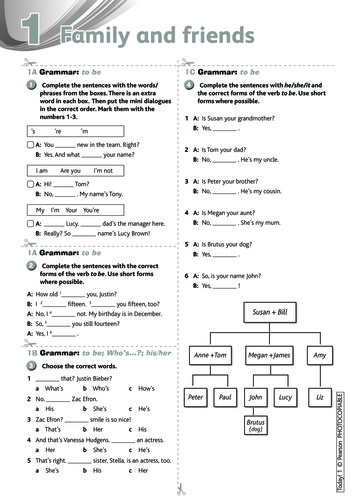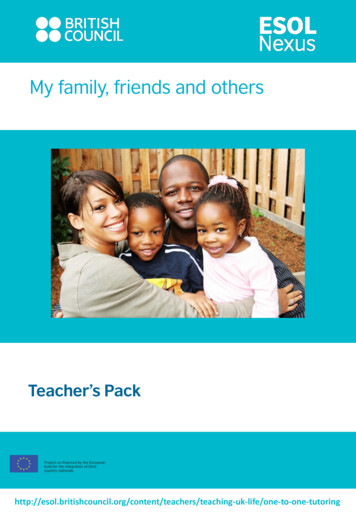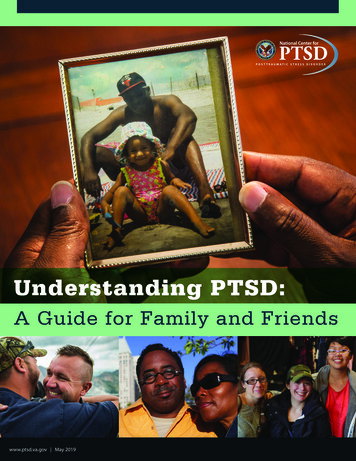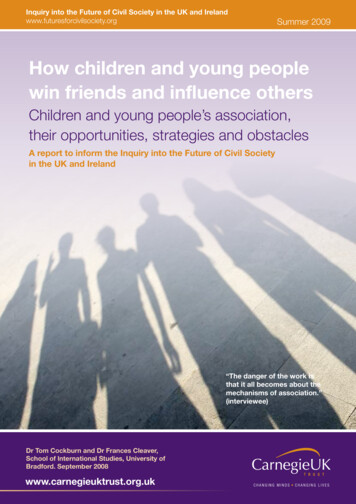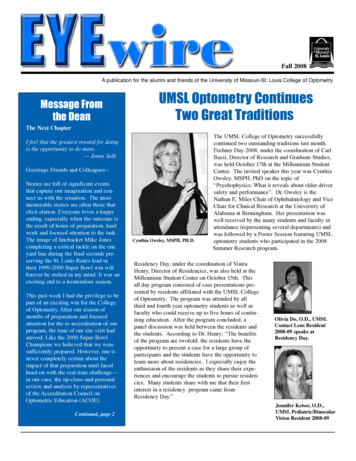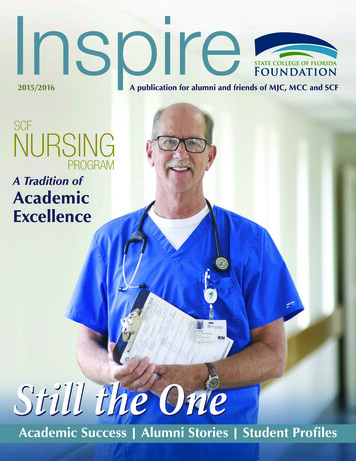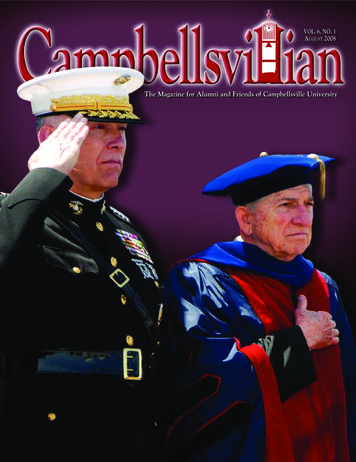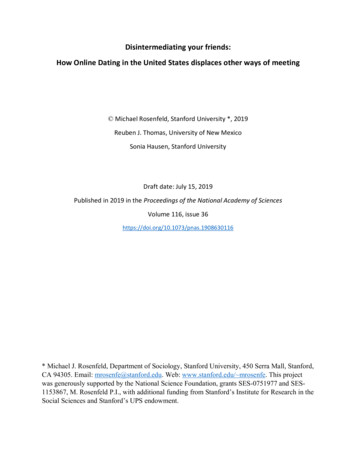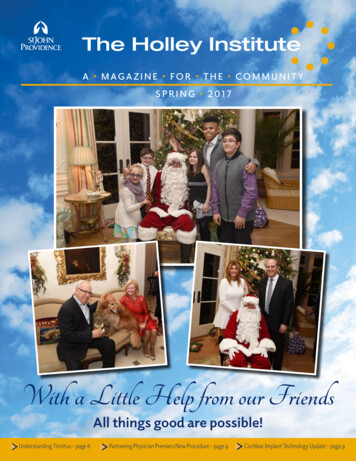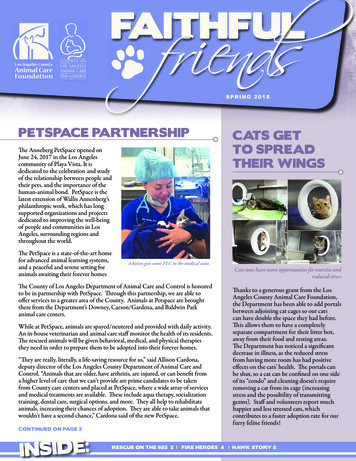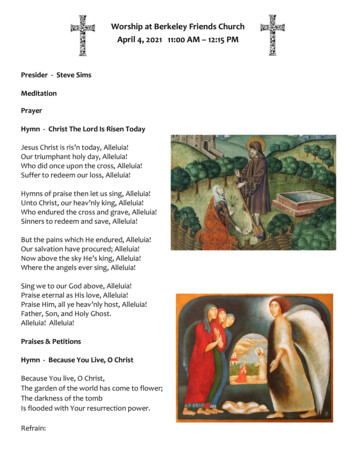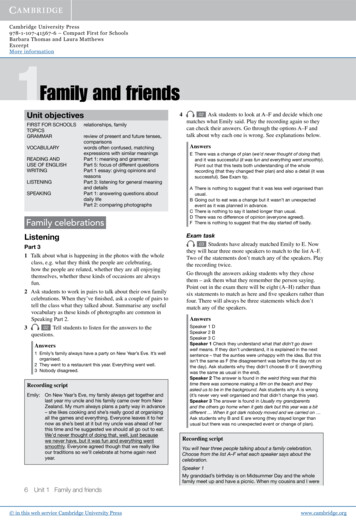
Transcription
Cambridge University Press978-1-107-41567-6 – Compact First for SchoolsBarbara Thomas and Laura MatthewsExcerptMore information1Family and friendsUnit objectivesFIRST FOR SCHOOLSTOPICSGRAMMARVOCABULARYREADING ANDUSE OF ENGLISHWRITINGLISTENINGSPEAKINGrelationships, familyreview of present and future tenses,comparisonswords often confused, matchingexpressions with similar meaningsPart 1: meaning and grammar;Part 5: focus of different questionsPart 1 essay: giving opinions andreasonsPart 3: listening for general meaningand detailsPart 1: answering questions aboutdaily lifePart 2: comparing photographsFamily celebrationsListeningPart 31 Talk about what is happening in the photos with the wholeclass, e.g. what they think the people are celebrating,how the people are related, whether they are all enjoyingthemselves, whether these kinds of occasions are alwaysfun.2 Ask students to work in pairs to talk about their own familycelebrations. When they’ve finished, ask a couple of pairs totell the class what they talked about. Summarise any usefulvocabulary as these kinds of photographs are common inSpeaking Part 2.02 Tell students to listen for the answers to the3questions.Answers1 Emily’s family always have a party on New Year’s Eve. It’s wellorganised.2 They went to a restaurant this year. Everything went well.3 Nobody disagreed.Recording scriptEmily:On New Year’s Eve, my family always get together andlast year my uncle and his family came over from NewZealand. My mum always plans a party way in advance– she likes cooking and she’s really good at organisingall the games and everything. Everyone leaves it to hernow as she’s best at it but my uncle was ahead of herthis time and he suggested we should all go out to eat.We’d never thought of doing that, well, just becausewe never have, but it was fun and everything wentsmoothly. Everyone agreed though that we really likeour traditions so we’ll celebrate at home again nextyear.402 Ask students to look at A–F and decide which onematches what Emily said. Play the recording again so theycan check their answers. Go through the options A–F andtalk about why each one is wrong. See explanations below.AnswersE There was a change of plan (we’d never thought of doing that)and it was successful (it was fun and everything went smoothly).Point out that this tests both understanding of the wholerecording (that they changed their plan) and also a detail (it wassuccessful). See Exam tip.A There is nothing to suggest that it was less well organised thanusual.B Going out to eat was a change but it wasn’t an unexpectedevent as it was planned in advance.C There is nothing to say it lasted longer than usual.D There was no difference of opinion (everyone agreed).F There is nothing to suggest that the day started off badly.Exam task03 Students have already matched Emily to E. Nowthey will hear three more speakers to match to the list A–F.Two of the statements don’t match any of the speakers. Playthe recording twice.Go through the answers asking students why they chosethem – ask them what they remember the person saying.Point out in the exam there will be eight (A–H) rather thansix statements to match as here and five speakers rather thanfour. There will always be three statements which don’tmatch any of the speakers.AnswersSpeaker 1 DSpeaker 2 BSpeaker 3 CSpeaker 1 Check they understand what that didn’t go downwell means. If they don’t understand, it is explained in the nextsentence – that the aunties were unhappy with the idea. But thisisn’t the same as F (the disagreement was before the day not onthe day). Ask students why they didn’t choose B or E (everythingwas the same as usual in the end).Speaker 2 The answer is found in the weird thing was that thistime there was someone making a film on the beach and theyasked us to be in the background. Ask students why A is wrong(it’s never very well organised and that didn’t change this year).Speaker 3 The answer is found in Usually my grandparentsand the others go home when it gets dark but this year was a bitdifferent When it got dark nobody moved and we carried on Ask students why B and E are wrong (they stayed longer thanusual but there was no unexpected event or change of plan).Recording scriptYou will hear three people talking about a family celebration.Choose from the list A–F what each speaker says about thecelebration.Speaker 1My granddad’s birthday is on Midsummer Day and the wholefamily meet up and have a picnic. When my cousins and I were6Unit 1 Family and friends in this web service Cambridge University Presswww.cambridge.org
Cambridge University Press978-1-107-41567-6 – Compact First for SchoolsBarbara Thomas and Laura MatthewsExcerptMore informationsmall we loved it, but now we’ve all got things we do, like I’min a football team and my cousin has a job in a café. So wesuggested we had the party at home instead this year but thatdidn’t go down well. My parents were OK with it but my auntiessaid it would upset granddad and all the plans were alreadymade, so I had to miss my football match and the team lost –probably not because of me but you never know.Speaker 2My cousins live in the city and visit us twice a year. There’snever any discussion about what we’ll do when they arrive. Wepile the cars up with loads of stuff and head down to the beachwhere we have a huge barbecue. Then everyone does whatthey want – sit and read or play games or swim or whatever.It’s usually a really quiet place but the weird thing was that thistime there was someone making a film on the beach and theyasked us to be in the background. We didn’t mind because wejust carried on with what we were doing anyway.Speaker 3The first of May is a holiday and my family always have a bigmeal together at home. Usually the weather is nice and weeat outside. We always play the same games and eat thesame food and everybody knows what to expect. Usuallymy grandparents and the others go home when it gets darkbut this year was different because my uncle has a new jobin Brazil and he and my auntie and cousins are going to livethere for three years. When it got dark, nobody moved and wecarried on chatting until midnight because we all knew that theywouldn’t be here next year.Reading and Use of EnglishPart 1Vocabulary – Words often confused1 Look at the Exam tip together. Ask students to do A–D in1 and then discuss their answers. If they are struggling tosee the difference, get them to look the expressions up intheir dictionaries and write down some more examples.They could also work in pairs, each pair writing a sentencewith one of the expressions. Some of them can then be readaloud and the class can judge whether they have got theright meaning. The best ones could be written on the boardas further examples.Now ask students to do 2, check the answers and ask themwhat is different about this question. Question 1 tests justmeaning whereas Question 2 is dependent on grammar– depend and believe can be followed by a preposition,demand can’t be followed by a pronoun (we don’t say Hedemands us), whereas expect can (He expects us ).When practising for Reading and Use of English Part 1, tohelp students remember some common expressions like theones with at, you can get them to use their dictionaries towrite down several examples in different contexts.See the Workbook for further practice on words oftenconfused.Answers1 A at least B at once C at last D at all2 A expects B demands C depends D believes2 Ask students to skim the text very quickly without worryingabout the missing words and tell them not to look at thequestions 1–8. Tell them you are going to time them –one minute. This is a useful skill for Reading and Useof English, and Listening. Check their answers to thequestions. You could ask a couple of extra questions suchas:What was important to the people in northern countriesand why? (the seasons and the weather because they werehunters)What did they use to share? (meals)How did they celebrate? (they lit fires and candles and sangand danced)Answers1 It is the shortest / longest day.2 that the days will start to get longer and lighterExam taskStudents do the task. Remind them to read before and afterthe gaps.3 When everyone has finished, tell them to quickly readthrough the text again to make sure the word they’vechosen fits. Sometimes when you read the whole text, yourealise something doesn’t make sense.Check the answers and discuss any common mistakes.Answers1B2D3B4D5C6A7B8AStudents could choose a country in the farnorthern hemisphere and find out more information abouthow the people celebrate midwinter and midsummer there,both today and in the past. Some suggestions are Sweden,Norway, Denmark, Estonia, Finland, Latvia, Lithuania,Canada (Quebec).Students could research different festivals around the world.You could have a display of each of the festivals chosenwith a description and pictures. These could then be usedas practice for Speaking Part 2. Students can compare twofestivals – clothes, entertainment, food, etc.CLILFriendsSpeakingPart 104 In the first part of the exam, students are asked1personal information about themselves. The questions aredesigned to make the candidates feel at ease and give themtime to settle into the exam. However, they will of coursebe marked on what they say.Students should make sure they can talk about their ownlives – school, family, leisure time, future plans, likes anddislikes, etc.Unit 1 Family and friends in this web service Cambridge University Press7www.cambridge.org
Cambridge University Press978-1-107-41567-6 – Compact First for SchoolsBarbara Thomas and Laura MatthewsExcerptMore informationThe questions here are examples of the kind they might beasked in the exam. They start by listening to two studentsanswering the four questions. The notes summarise whatthey will talk about and students should add anything extrathey say.When they have listened, ask students what kinds of thingsGeorge and Francesca added to the basic information (theytalked about when, where, who with, how often, why, andgave more details). Students should get used to askingthemselves these questions when they give an answer – isthere anything else they can say about when, where, etc.Answers1 every Wednesday after school, favourite time2 relax first and watch TV3 Saturdays – friends in city centre, shopping, chatting; Sundaymornings – grandmother4 Saturday – bus to town with friends as usual, probablycinema; Sunday – practise guitar for concert on TuesdayRecording scriptExaminer:Hello, George. I’m going to ask you somequestions about yourself. Do you do any activitiesafter school?George:Yes, I do. I’m learning to dive so I have a lessonevery Wednesday after school in the pool. That’smy favourite time in the whole week.Examiner:When do you do your homework?George:When I get home from school, I watch TV. I like torelax for an hour so I prefer to do my homeworkafter dinner.Examiner:Francesca, what do you usually do at theweekend?Francesca:I usually meet my friends in the city centre onSaturdays and we spend all afternoon shoppingand chatting. On Sunday mornings, I go to seemy grandmother.Examiner:What are you going to do next weekend?Francesca:On Saturday, I’m going to get the bus to townwith my friends as usual and we’ll probably go tothe cinema. But on Sunday I’ll be practising myguitar most of the day as I’m playing in a concertnext Tuesday. I know I need to practise a lotbefore that!204 Ask students to try to remember what the speakerssaid and fill in the gaps. Play the recording again forthem to check. Go through the answers – these will beused in Exercise 3 to discuss the grammar. Give studentsthe recording script (page 78) so they can underline theanswers.Answers1234568’m learningget; watch’m going to get’ll probably go’ll be practising’m playingGrammar – Present and future tenses3 Using students’ answers to Exercise 2, ask the class thequestions. Revise the difference between the following:present continuous (George’s diving lessons are happeningover a period of time) and the present simple (habits); whenwe use will, going to and the present continuous for thefuture; when we use the future continuous.Refer students to the Grammar reference, SB page 78.Answers12345present continuous (I’m learning)present simple (get home, watch TV)going to (intention), will (uncertain future plan)future continuous as it’s over a period of timepresent continuous (definite plan)4 Elicit from students that the sentences in A are correctbecause these are all state verbs which cannot be used in acontinuous tense. Ask them to think of other verbs whichbehave like this – see Grammar reference, SB page 78, forexamples.5 This exercise practises present and future tenses and stateverbs. Check students know that conjunctions like when,after, until, before, as soon as are followed by the presenttense even when there is a future meaning, e.g. I’m going todo my homework before my friend gets here.You could follow up this section by checking students’knowledge of prepositions and determiners with days andtimes. Write some sentences from the listening on the boardwith gaps, e.g.:I have a lesson . Wednesday (every)What do you usually do . the weekend? (at)I usually meet my friends in the city centre . Saturdays (on). Sunday mornings I go to see my grandmother. (On)What are you going to do . next weekend? (-)Ask students when we use on (before days of the weekand dates), at (before times e.g. six o’clock, lunchtime, theweekend, the end of the day, etc.), no preposition (beforetoday, tomorrow (morning), this/next (weekend)), in (beforemonths, seasons, years).Answers12345678910’re meetingwantnormally spend’re goingthinkget’m goinggo’m writing; ’m going to miss’re comingSee the Workbook for extra practice on prepositions anddeterminers with days and times.Exam taskGet students to spend a few minutes thinking about what theydo after school, when they do their homework, what they doat weekends and their plans.
Family celebrations Listening Part 3 1 Talk about what is happening in the photos with the whole class, e.g. what they think the people are celebrating, how the people are related, whether they are all enjoying themselves, whether these kinds of occasions are always fun. 2 Ask students to work in pairs to talk about their own family celebrations. When they’ve fi nished, ask a couple of pairs to
